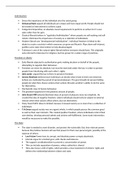Individualism
Stress the importance of the individual over the social group.
Immanual Kant argued all individuals are unique and have equal worth. People should not
be treated as instruments to achieve a goal.
Categorical imperative, an absolute moral requirement to perform an action for it’s own
sake rather than for gain.
Classical liberals believe in “egotistical individualism” where people are self-seeking and self-
reliant. Minimises the importance of society as a collection of individuals.
Modern liberals see “developmental individualism”, individual freedom is linked to the
desire to create a society in which everyone can grow and flourish. Plays down self-interest,
justifies some state intervention to help disadvantaged.
Tolernace is one of the natural rights liberals believe everyone should have. This originally
only referred to tolerance for religions, but has grown for a wider range of practices.
Freedom or Liberty
Early liberals objected to authoritarian govts making decision on behalf of the people,
attempting to regulate their behaviour.
Freedom can never be absolute, but must be exercised under the law, in order to protect
people from interfering with each other’s rights.
John Locke argued the law is there to preserve freedom.
Jeremy Bentham believed each individual can decide what is best in their own interests.
Actions are motivated by pursuit of personal pleasure. The govt should not prevent letting
people do what they choose unoless their actions threaten another’s ability to do the same
for themselves.
Mechanistic view of human behaviour.
The greatest happiness for the greatest amount of people.
John Stuart Mill believed Bentham ideas of pursuit of pleasure were too simplistic. He
created the idea of negative freedom, where individuals should only be subject to external
restrain when their actions affect others, but not themselves.
Many found Mill’s ideas to limited, because it viewed society as no more than a collection of
individuals.
T.H.Green argued society was an organic whole, in which people persue the common good
as well as their own interests. This created positive freedom, where individuals control their
own destiny, develop personal talents and achieve self-fulfillment. Some state intervention
would be necessary to make this possible.
The State
The state is needed to avert disorder, and protect the vulnerable. But, they mistrust power,
because they believe humans will use that power for their own personal gain, possibly at the
expense of others.
Lord Acton Power tens to corrupt, and absolute power corrupts absolutely.
Liberals argue for a limited govt, with checks and balances.
The support constitutionalism to prevent a concentration of power.
This can include separation of powers, where authority is shared.
They also favour a bill of rights, which provides a clear statement of citizens’ rights and
defines the relationship between citizen and state.
, They support devolution to regional bodies, as the UK did, with the creation of the
Scottish Parliament, and assemblies for Wales and N.Ireland.
Classical liberals believe in laissez-faire capitalism. Adam Smith in The Wealth of
Nations, believed self-interest played a part in economic growth.
Rationalism
Individuals should be free to judge their own interests without needed to be guided by
external authorities, such as the state or church leaders.
People will not always make correct decisions but it is better for them to take responsibility
for themselves.
Liberals were encouraged by development of science which liberated people from blind faith
in authority and religion.
Competition between individuals creates conflict, but they favour reasoned debate and
negotiation to resolve this.
Classical liberals developed methods of industrial arbitration to divert legal actions and
strikes.
War is the last resort, should be avoided if possible.
They supported the League of Nations for this reason. Which supported bringing countries
together to discuss disputes.
Many support the European Union, by surrendering some national sovereignty, they can
have free-trade.
Equality
Equality of opportunity. Liberals accept different outcomes because people have different
abilities and potential.
Foundational equality believes individuals and should have the same legal and political
rights, ensured by equality before the law.
Socialists criticize liberalism on the grounds it does not tackle inequality because it is linked
to the idea of capitalist competition.
Socialists aim to achieve equality of outcome by using the power of the state to distribute
wealth.
Classical liberals believe individuals with different talents should be rewarded differently.
The social inequality is beneficial for society because it gives people an incentive to work
hard and make the most of their abilities.
This is a meritocracy.
William Gladstone introduced competitive examinations for the civil service bringing an end
to appointments made by aristocratic connections.
Mary Wollstonecraft argued women were no less deserving rational beings than men, and
were entitled to the same rights to pursue a career and to won their own property.
Modern liberals support full civil rights for women and minorities.
Barack Obama supported the rights of trans pupils to use the bathroom of their choice at
school.
Modern liberals value some state intervention to narrow social inequalities. True equality is
not possible without social justice. They do not believe in equality of outcome.
John Rawls A Theory of Justice, reconciles between liberal individualism and prevention of
excessive inequality.




